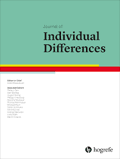
JOURNAL OF PERSONALITY AND SOCIAL PSYCHOLOGY
Scope & Guideline
Pioneering Research in Social Psychology and Beyond
Introduction
Aims and Scopes
- Personality Development and Dynamics:
The journal explores how personality traits evolve over time and their implications for behavior and well-being, emphasizing longitudinal and developmental perspectives. - Social Influence and Intergroup Relations:
A significant focus is placed on understanding the mechanisms of social influence, including intergroup interactions, prejudice, and group dynamics, especially in diverse contexts. - Emotion and Motivation:
Research on the role of emotions in shaping motivations, social behaviors, and interpersonal relationships is a core area, highlighting the complex interplay between affect and psychological processes. - Cultural and Contextual Factors:
The journal examines how cultural norms and situational contexts shape psychological constructs and behaviors, offering insights into cross-cultural psychology and the social implications of individual actions. - Methodological Innovations:
The journal encourages the use of diverse research methodologies, including experimental designs, qualitative approaches, and advanced statistical techniques to deepen insights into psychological phenomena.
Trending and Emerging
- Interpersonal Dynamics in Digital Contexts:
There is a growing interest in how digital interactions affect interpersonal relationships, social perceptions, and mental health, particularly in the context of social media and online communication. - Intersectionality and Identity:
Research focusing on the intersections of various identities (e.g., race, gender, sexuality) is gaining traction, emphasizing the complexity of social dynamics and the multifaceted nature of individual experiences. - Crisis and Resilience Psychology:
Studies exploring psychological resilience in the face of crises (e.g., the COVID-19 pandemic) are increasingly prominent, highlighting adaptive mechanisms and interventions for maintaining well-being. - Prosocial Behavior and Altruism:
There is an emerging focus on understanding the psychological underpinnings of prosocial behaviors, including altruism and community engagement, especially in response to social justice movements. - Dynamic Models of Personality and Context:
Research is increasingly adopting dynamic models that examine how personality traits interact with situational factors, providing a more holistic view of behavior and psychological outcomes.
Declining or Waning
- Traditional Trait Theories:
There has been a decline in studies heavily reliant on traditional trait theories, as researchers increasingly adopt more dynamic and contextual approaches to understanding personality. - Static Models of Personality Assessment:
Research utilizing static models of personality assessment, such as single-time-point measures, has waned in favor of more nuanced, longitudinal methodologies that capture personality change over time. - Overemphasis on Negative Psychological Constructs:
There appears to be a shift away from a predominant focus on negative constructs (e.g., maladaptive traits) towards a more balanced exploration of positive psychology and well-being. - Generalized Social Comparison Theory:
The general application of social comparison theory has declined, as researchers now concentrate on specific contexts and variables that influence social comparison processes. - Single-Culture Studies:
Research that focuses exclusively on single cultural contexts is decreasing, with more emphasis being placed on cross-cultural studies that examine psychological processes across diverse populations.
Similar Journals

EUROPEAN JOURNAL OF PERSONALITY
Fostering Scholarly Exchange on Personality DynamicsWelcome to the EUROPEAN JOURNAL OF PERSONALITY, a premier academic journal published by SAGE PUBLICATIONS LTD, dedicated to advancing the field of social psychology. With an impressive impact factor that places it in the Q1 category within its domain, this journal ranks 10th out of 310 in the Scopus database, firmly sitting in the 96th percentile. Since its inception in 1987, the EUROPEAN JOURNAL OF PERSONALITY has provided a platform for cutting-edge research that explores the intricate dynamics of personality and individual differences within social contexts. Researchers and professionals will find that the journal not only fosters scholarly exchange but also addresses critical issues relevant to contemporary psychology. Published in the United Kingdom, the journal is committed to maintaining high standards of scientific rigor and accessibility. As a vital resource for students and academics alike, it aims to inspire future research and deeper understanding in the psychological landscape.

International Journal of Social Psychology
Illuminating the intersections of society and psychology.The International Journal of Social Psychology, published by SAGE PUBLICATIONS INC, is a prominent journal dedicated to the exploration of social psychological phenomena and their implications. With an ISSN of 0213-4748 and an E-ISSN of 1579-3680, this peer-reviewed journal has been a valuable resource since its inception in 1986. Operating from the United Kingdom, it currently holds a Category Quartile of Q3 in Social Psychology and ranks 118th out of 310 in the Scopus database, reflecting its growing influence as it reaches the 62nd percentile among its peers. The journal is committed to advancing knowledge through rigorous research and discourse in the field of social psychology, making it an essential publication for researchers, professionals, and students alike. With open access options available, it aims to disseminate impactful findings and foster a collaborative environment within the academic community.

Primenjena Psihologija
Unlocking the Power of Psychology in Everyday LifePrimenjena Psihologija is a prominent academic journal published by the Univ Novom Sadu, dedicated to the field of Applied Psychology. With an ISSN of 1821-0147 and E-ISSN of 2334-7287, this open-access journal has been fostering scholarly discourse since its transition to open access in 2008. Emerging from Serbia, it provides a platform for researchers, practitioners, and students to share innovative findings that advance the understanding of psychological principles in real-world settings. The journal, focusing on topics relevant to various psychology applications, holds a Q4 ranking in the 2023 Applied Psychology category and is indexed in Scopus with a current percentile standing of 13th. The editorial team, committed to enhancing the journal's scope from 2017 to 2024, seeks submissions that explore contemporary challenges and developments in the field. By promoting accessibility to vital research, Primenjena Psihologija plays a crucial role in the dissemination of knowledge and the advancement of applied psychology in both academic and practical contexts.

Acta Psychologica Sinica
Fostering Excellence in Psychological Research and ThoughtActa Psychologica Sinica, published by SCIENCE PRESS, is a premier journal in the field of psychology, dedicated to advancing the understanding of psychological science through rigorous research. Located in Beijing, China, this journal covers a broad spectrum of topics within the field, aiming to foster the dissemination of innovative and influential psychological research. With an impact factor that reflects its growing prominence, it is classified in the Q3 quartile for Psychology (miscellaneous) as of 2023, indicating its relevancy and contribution to the discipline. Researchers, professionals, and students alike will find valuable insights within its pages, as it encompasses diverse psychological perspectives and methodologies. Although it operates under a traditional publication model without open-access options, the quality of research featured here makes it a vital resource for those seeking to stay informed on current developments and trends in psychology.

International Review of Social Psychology
Elevating Research in the Realm of Social PsychologyInternational Review of Social Psychology is an esteemed academic journal published by UBIQUITY PRESS LTD that has been making significant strides in the field of social psychology since its inception in 2016. With an impressive impact factor reflecting its high-quality research output, this Open Access journal offers unrestricted access to scholarly articles, encouraging global discourse and collaboration. Based in the United Kingdom, the journal occupies a prestigious position, ranking #76 out of 310 in the Scopus category of Social Psychology, placing it within the top 75th percentile of its field. The Q1 quartile classification for 2023 underscores its significant contribution and influence in advancing the science of social behavior and thought. Covering a broad array of topics, from group dynamics to social influence, the journal aims to stimulate critical dialogue among researchers, practitioners, and students alike, promoting a deeper understanding of the complexities of social interactions. With its commitment to open and impactful research, the International Review of Social Psychology is an essential resource for anyone interested in the ever-evolving landscape of social psychology.

Journal of Individual Differences
Connecting Minds Through Individual DifferencesThe Journal of Individual Differences, published by HOGREFE PUBLISHING CORP in Germany, delivers critical insights into the diverse psychological and neuroscientific factors that define individual variability. With an ISSN of 1614-0001 and an E-ISSN of 2151-2299, this journal aims to foster research that illuminates the complexities of human behavior through the lens of individual differences, making it an essential resource for both researchers and practitioners in the fields of psychology and biological psychiatry. The journal's notable ranking in 2023 includes Q4 in Biological Psychiatry and Q3 in miscellaneous Psychology categories, reflecting its commitment to advancing knowledge in these critical areas. Spanning from 2005 to 2024, it serves as a platform for original research, theoretical articles, and reviews that are not only timely but also pivotal for understanding the intricate tapestry of human cognition and emotion. As an indispensable tool for those seeking to deepen their understanding of psychological diversity, the Journal of Individual Differences invites contributions from a broad spectrum of disciplines, ensuring a comprehensive approach to its impactful studies.

CANADIAN JOURNAL OF BEHAVIOURAL SCIENCE-REVUE CANADIENNE DES SCIENCES DU COMPORTEMENT
Advancing insights into human behavior.Canadian Journal of Behavioural Science - Revue Canadienne des Sciences du Comportement (ISSN: 0008-400X, E-ISSN: 1879-2669), published by the Canadian Psychological Association, serves as a vital conduit for research and discourse in the dynamic field of psychology. Since its inception in 1973, the journal has been committed to advancing knowledge in behavioral science, offering a platform for empirical studies, theoretical explorations, and practical applications. It notably holds a 2023 Scopus Q2 ranking in the category of Psychology (Miscellaneous), showcasing its influence with a percentile rank of 77th among its peers, and underscores its commitment to quality research. The journal, although utilitarian in shifting between specific years of publication from 1973 to 2024, consistently aims to enhance the understanding of human behavior through rigorous scholarship. Authors and readers alike benefit from the journal's focus on a wide array of interdisciplinary topics, making it an indispensable resource for researchers, professionals, and students dedicated to the intricacies of psychological science. For those looking to remain at the forefront of the behavioral sciences, the Canadian Journal of Behavioural Science continues to be a go-to publication for such endeavors.

MOTIVATION AND EMOTION
Pioneering Research on the Interplay of Emotion and MotivationMOTIVATION AND EMOTION is a premier academic journal published by Springer/Plenum Publishers, dedicated to advancing the field of psychology through a comprehensive exploration of motivation and emotional processes. Since its inception in 1977, this journal has consistently provided a platform for high-quality research, being recognized in the top quartile (Q1) for both Experimental and Cognitive Psychology as well as Social Psychology in 2023. With impressive Scopus rankings — 29th in Experimental and Cognitive Psychology and 68th in Social Psychology — it offers substantial insights that engage researchers, professionals, and students alike. The journal emphasizes empirical studies, theoretical discussions, and methodological advancements that contribute to the understanding of emotional influences on motivation across diverse contexts. Although it does not currently offer open access, its contributions remain pivotal for those exploring the intricate dynamics of human behavior.

Current Issues in Personality Psychology
Illuminating Trends in Personality PsychologyCurrent Issues in Personality Psychology, published by TERMEDIA PUBLISHING HOUSE LTD, is an esteemed Open Access journal dedicated to advancing the field of social psychology with a specific focus on personality studies. Since its inception in 2013, this journal has provided a platform for innovative research, critical reviews, and theoretical discussions that address contemporary issues in personality psychology. With an ISSN of 2353-4192 and an E-ISSN of 2353-561X, it is recognized for its contribution to the academic community, currently holding a Q3 category status in the 2023 Social Psychology quartiles. The journal covers converged years from 2016 to 2024, ensuring that it remains at the forefront of emerging trends and scholarly debates. Operating from Poznan, Poland, Current Issues in Personality Psychology remains committed to fostering open dialogue among researchers, professionals, and students, providing vital insights into the complexities of personality and its implications for social behavior.

Social Psychology
Advancing understanding of social dynamics.Social Psychology is a premier journal published by HOGREFE PUBLISHING CORP, dedicated to advancing the field of social psychology through rigorous research and innovative theory. With a strong foundation established since its inception, the journal boasts an impressive impact, having achieved Q1 status in Arts and Humanities and Sociology and Political Science as of 2023, reflecting its importance in interdisciplinary research. Based in Germany, and accessible via both print (ISSN: 1864-9335) and electronic formats (E-ISSN: 2151-2590), it serves as a vital resource for academics and practitioners seeking to understand the dynamics of social behavior. The journal offers open access options, ensuring that findings are widely disseminated and accessible to a global audience. With a focused scope covering key issues in social influences, group dynamics, and interpersonal relationships, Social Psychology is an essential platform for those committed to enhancing our comprehension of the social dimensions of human life.